|
Back to Index
Update
on first fuel delivery to Hwange
Zimbabwe Conservation Task Force (ZCTF)
October 28, 2005
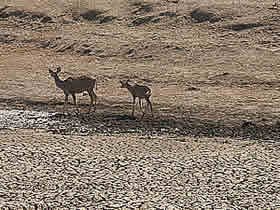 |
|
Kudu looking for water at a dry pan |

In the report
we circulated about our first fuel delivery to Hwange National Park,
we said that we were waiting for photographs that were taken in
Hwange after our departure. We have now received them. Below are
a small selection of the numerous photos received.
Second delivery
A very special thank you to all the wonderful people who were generous
enough to donate funds which enabled us to buy a further 10 000
litres of diesel and our heartfelt appreciation goes to the Unifreight
Group who assisted us with a truck to take the fuel to Hwange. The
truck we used was not able to carry the full amount so we delivered
just under 9 000 litres - half to Sinamatella and the balance to
the Main Camp area. We will deliver the remaining 1 000 litres on
the next trip.
We loaded up the diesel and left Harare on Wednesday 19th October.
Joanne Buckley Lamb, a member of the ZCTF team and a qualified conservationist
followed the truck in her landrover. We booked her into Sinamatella
for a month so that she can monitor and supervise the distribution
of the fuel and report back to us at regular intervals.
We offloaded
half of the fuel into the underground tanks at Sinamatella. We discovered
whilst we were there that the fuel shortage is not the only problem
in Hwange. Several of the pump engines are not working and the National
Parks staff there, most of whom are very concerned about the welfare
of the wildlife, are fighting a losing battle because they are unable
to obtain the spare parts to repair the engines.
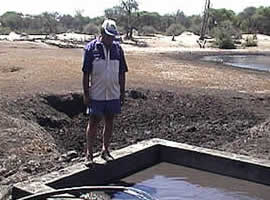 |
| Johnny
Rodrigues watches as fresh water is pumped into a trough |

We
hope that we have delivered enough fuel to last until the rains
start but it has now become top priority to source spare parts for
the Lister engines. Even with the fuel we have delivered, the situation
all over Hwange National Park is catastrophic and we have to get
those engines running. If anybody can help with Lister spares or
engines, either as a donation or for sale, please contact us as
soon as possible. Contact details are below. If we can raise more
funds, we will buy spares and/or engines so if anyone can help with
funds we would be most grateful.
We spent the night in Sinamatella and early the next morning, set
off for Main Camp. We delivered the remainder of the fuel to The
Hide in the Main Camp area where it will be carefully monitored
and distributed by Barry Wolhuter whose invaluable assistance is
greatly appreciated.
After our first fuel delivery of 7 000 litres to this area, 9 pumps
were running but Main Camp is experiencing the same problems as
Sinamatella. The engines have not been maintained and have all started
breaking down. Due to this, The Hide is one of the very few places
that still has water, although the water in the pan is extremely
low and is so muddy that the animals are not able to drink it.
At The Hide,
fresh water is however being pumped 24 hours a day into the trough
in front of the pan but there is such an intense concentration of
animals drinking from it, that the trough never gets full enough
for water to overflow into the pan. Under normal circumstances,
there would be several watering points for the animals and they
would all be spread out throughout the park, drinking from different
pans but in this critical situation, where the watering points are
so few and far between, the animals will naturally congregate where
they know they can get water.
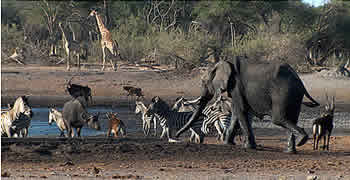 |
| Animals
rush to the water trough and pan |
 The
sight we were greeted with when we arrived at The Hide can only
be described as total mayhem. For as far as the eye could see, were
herds and herds of buffalo walking towards the trough to drink.
Around the pan and the trough were more animals than we have ever
seen before. At one time, we counted 10 different species all there
at the same time. It was the saddest, most incredible sight we have
ever seen. The
sight we were greeted with when we arrived at The Hide can only
be described as total mayhem. For as far as the eye could see, were
herds and herds of buffalo walking towards the trough to drink.
Around the pan and the trough were more animals than we have ever
seen before. At one time, we counted 10 different species all there
at the same time. It was the saddest, most incredible sight we have
ever seen.
We sat and watched the drama for hours on end. It went on all day
and all night. Buffalo take precedence over the smaller animals
so whilst the buffalo were drinking from the trough, the smaller
animals such as zebra, kudu, sable, impala, monkeys and wildebeest
had no option but to wait their turn. The buffalo would not allow
any other species to come near the trough while they were drinking
and this took a few hours in view of the huge numbers of buffalo
wanting to drink.
The zebras became more and more impatient and finally, in desperation
plucked up the courage to try and force their
way in but they were quickly put in their place.
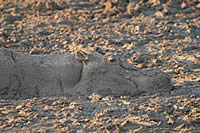 |
| Hippo
in the mud. He was seen lying like this in the mud for 2 days
and then he disappeared so he is presumably still alive. |

Eventually,
the buffalo moved off and the zebra had their chance to rink. Then
the sable came in and forced the zebra out with their lethal horns.
We very seldom saw two different species drinking from the trough
at once - the animals wouldn't allow it.
After all this,
the trough was almost dry, despite the fact that water was flowing
into it constantly through a pipe so we decided to fill it with
2 000 litres of water from The Hide's bowser. When the landrover
towing the bowser approached the trough, the animals all moved off
into the trees nearby and waited for it to leave so that they could
return to the trough.
As soon as the landrover drove away, the smaller animals such as
monkeys and impala seized the opportunity and managed to drink for
a few minutes before the larger animals came back.
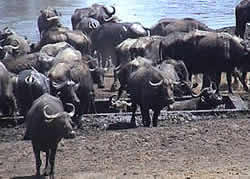 |
| Total
mayhem as herds and herds of buffalo walk towards a trough to
drink water |
 It
wasn't long before the buffalo forced their way in again, but not
for long because towards evening, the elephants came in and they
are a force to be reckoned with. Several families of elephants lumbered
in, flapping their ears and swiping the buffalo away from the trough
with their trunks. It was quite clear who the "King of the
Jungle" was. It
wasn't long before the buffalo forced their way in again, but not
for long because towards evening, the elephants came in and they
are a force to be reckoned with. Several families of elephants lumbered
in, flapping their ears and swiping the buffalo away from the trough
with their trunks. It was quite clear who the "King of the
Jungle" was.
Within half an hour, the water level in the trough was very low
again but the elephants stayed all night. We could hear them trumpeting
all through the night and they were still there around the trough
when we woke up the next morning.
We would like to thank Barry and Bridget Wolhuter and the management
and staff of The Hide for once again accommodating and feeding us
in the interests of conservation. It was a great privilege for us
to stay in this beautiful, world class safari camp, albeit for one
night, where the food and service is second to none. The Hide is
like an oasis in the desert and we highly recommend it to anyone.
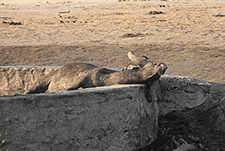 |
| Dead
buffalo in trough. There was actually water in this trough and
it is thought that this buffalo found the water too late and
died of exhaustion. |

Although our
trip to Hwange was unforgettable and spectacular as far as game
viewing goes, we were also witnessing a tragedy. When animals are
so desperate for water that they will kill each other to get it,
we have to do something to help. The elephant in this last picture
was killed by another elephant in a fight for water and several
animals have already died of dehydration.
As soon as we start raising more funds, we will buy the spare parts
for the engines and go up to Hwange with a team of mechanics and
do the repairs. Our plan for the future is to make regular visits
to Hwange to ensure that a crisis of this nature never happens again.
If anyone can help, please contact us as soon as possible. The longer
we wait, the more animals are going to die.
Johnny Rodrigues
Chairman for Zimbabwe Conservation Task Force
Visit the ZCTF
fact
sheet
Please credit www.kubatana.net if you make use of material from this website.
This work is licensed under a Creative Commons License unless stated otherwise.
TOP
|

